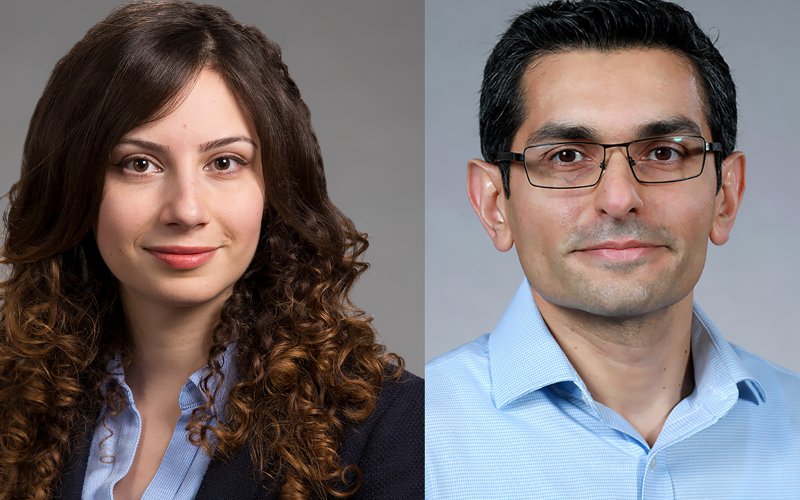CEAS Faculty Garner CAREER Awards for Advancing Online Education and Cybersecurity

ALBANY, N.Y. (April 29, 2021) – The National Science Foundation (NSF) refers to its Faculty Early Career Development (CAREER) Program as its most prestigious award in support of junior researchers at the commencement of their academic journeys. The Foundation-wide activity provides awards to “early-career faculty who have the potential to serve as academic role models in research and education and to lead advances in the mission of their department or organization.” These activities should build a firm foundation for a lifetime of leadership in integrating education and research, according to NSF.
At UAlbany’s College of Engineering and Applied Sciences (CEAS), two faculty members have joined the esteemed ranks of CAREER Award winners, as they lead projects, which combined will receive more than $1.1 million in NSF funding, aimed at securing web applications and advancing personalized online education: Assistant professors of Computer Science Amirreza Masoumzadeh and Shaghayegh (Sherry) Sahebi. With their respective grants, CEAS now has seen eight faculty members receive CAREER awards, including researchers in Computer Science and Electrical and Computer Engineering.
Masoumzadeh’s project, CAREER: Black-Box Learning of Web Application Authorization Policies, devises a novel framework for understanding the authorization behavior of web applications. It will enable automated learning of fine-grained authorization policies from web applications without relying on access to their source codes or understanding other internal complexities. Masoumzadeh was awarded $574,719 from NSF for the 5-year project.
Sahebi’s project, CAREER: Time-Aware Multi-Objective Recommendation in Online Learning Environments, is designed to advance learning in online educational systems by assisting students in achieving personalized, efficient, and continuous learning. Sahebi’s research team will investigate a new generation of educational recommendation and personalization systems that are capable of suggesting learning materials of heterogeneous types to students, according to multiple learning and behavioral goals, in continuous time. She has been awarded $547,705 from NSF for the 5-year grant.
“With five new CAREER Awards in just the past four years, and with three of those going to women, the College is setting a remarkable pace in the growth of its research portfolio and national recognition while still in its early days. We are all enormously proud of the exceptional work Amir and Sherry are doing as they advance the CEAS mission of Science in Service to Society,” said CEAS Dean Kim L. Boyer.
CAREER: Black-Box Learning of Web Application and Authorization Policies
“Web application operators and users need to understand who can access data in the applications and under what circumstances in order to be able to safely and effectively use them. But most systems today provide an incomplete and/or inaccurately documented authorization policy," said Masoumzadeh, who also serves as co-director of the Albany Lab for Privacy & Security (ALPS).
The issue, according to Masoumzadeh, is that end users need to rely on a few scattered pieces of information provided by applications and their own experience to come up with (probably inaccurate) answers to those questions. Even system developers may not be able to comprehend the overall authorization policy of their system due to code complexity, heterogeneity, scale, and fast-paced development.
"This CAREER project aims to devise a novel theoretical framework for automatically learning policies by observing the security behavior of applications and to develop techniques for integrating the framework in the web domain,” continued Masoumzadeh.
CAREER: Time-Aware Multi-Objective Recommendation in Online Learning Environments
“Modern online learning systems try to guide students to the learning materials by answering simple questions like: What problem is the closest to the student's current knowledge? And which video lecture is the most interesting for the student? However, learning is a complicated behavior in which other factors, such as the timing of student studies, the kind of learning resources students practice with, and the goals that students have are essential," said Sahebi, who serves as director of the Personalized Artificial Intelligence Lab (PersAI).
As a result, says Sahebi, answering the above questions is inadequate to fully address the complicated personalized learning material recommendation problem.
"In this project, we devise machine learning models and algorithms that can optimize answering complicated questions, such as: how to select the learning material that balances between a student's interests and knowledge gain? What combination of problems and video lectures is the most effective way for a particular student to learn? Or when should a student practice a concept to best achieve her learning goals? This research could go beyond the education domain to address long-term time-sensitive multi-objective recommender systems' research in other application areas, such as health and fitness,” continued Sahebi.
CAREER Awards at CEAS
In addition to Masoumzadeh and Sahebi, previous CAREER Award recipients include Professor of Electrical and Computer Engineering Won Namgoong (2002), former Professor of Computer Science Siwei Lyu (2010), Associate Professor of Computer Science Jeong-Hyon Hwang (2012), former Associate Professor of Computer Science Feng Chen (2018), Assistant Professor of Computer Science Mariya Zheleva (2019), and Assistant Professor of Electrical and Computer Engineering Daphney-Stavroula Zois (2020).




